Words MAXMILIAN WECHSLER
His Excellency Ganesh Prasad Dhakal is Ambassador of Nepal to the Kingdom of Thailand and also Permanent Representative to UNESCAP. On top of that, he is concurrently accredited as Nepal’s ambassador to Cambodia, Laos, Singapore and Vietnam. To say he is a busy man is an understatement, but when we met at the Nepali Embassy on Sukhumvit 71 the Ambassador was relaxed and focused on our interview. He seemed to project a certain mindfulness often associated with the ascetics and adventurers who have always been drawn to the mountainous nation he represents.
|
Background
“Fulfilling a long held ambition, I joined the Ministry of Foreign Affairs (MFA) in 1996. There were many other applicants wishing to join the MFA, which requires taking an examination conducted by the Public Service Commission — an independent constitutional body of Nepal. I passed the grueling exam and began work for the Ministry as a Section Officer, which is a junior officer rank,” said the Ambassador. “I visited Thailand for the first time in 2016 while in transit. I stayed for two nights and was impressed by the experience. The second time was in November of 2018; I was on the way back to Nepal and stayed here for a night. “When my government appointed me as Ambassador to Thailand, Cambodia, Laos, Singapore and Vietnam, I was very elated,” he said with a smile. “I began my term in Thailand on June 9, 2019. I came here with my wife and our two children. My wife attends to our domestic needs and frequently accompanies me at various diplomatic functions and events. “Among other responsibilities I am also a member of the Board of Trustees of the Asian Institute of Technology (AIT). AIT specializes in engineering, advanced technologies, sustainable development, management and planning, which all are important areas for Nepal. |
“My main job is to protect the interests of Nepali nationals, strengthen bilateral relations and expand bilateral cooperation with Thailand and the other countries I am accredited to: Cambodia, Laos, Singapore and Vietnam. I presented a letter of credence in Laos in February this year and I am awaiting the opportunity to do the same in Cambodia, Singapore and Vietnam. Be that as it may, I am keeping close contact with ambassadors of these countries in Bangkok.
“Every day is unique for me with new tasks and dealings, so I can’t say I have a consistent daily routine. I spend most of my time on matters that contribute to strengthening and expanding the Nepal-Thailand relationship, which is already friendly and cooperative.
“Nepal and Thailand share a traditional and historic relationship, influenced by the philosophy of Buddhism. Thai people like to visit Nepal not only to pay respect to Lord Buddha’s birthplace, Lumbini, but also to enjoy the unique cultural and natural diversity. Young Thai people like to go to Nepal for adventure tourism, which includes trekking, jungle safari and white water rafting among others. Of course, Nepal is also widely known for Mount Everest (Sagarmatha in Nepali), which at 8,848 meters, is the highest peak in the world.
“Since my arrival in Thailand I have enjoyed it here very much. Thai people are very friendly and cooperative.
There are many similarities in culture and family values between Nepal and Thailand, which bring our two countries closer. Nepal is a very diverse country in terms of culture, religion and nature. But there is no question that Buddhism has had a profound influence in our culture and outlook. I also enjoy my official duties and engagements in Thailand, meeting with people of both government and private sectors.
“All in all, I am very happy with my posting here. People often assume that it must be too hot and humid for me, but actually in the southern part of Nepal where I am from, the weather is quite similar. That is why I don’t feel much difference in terms of weather here. In Nepal, we have a very diverse climate: in the south it is tropical most of the year, in the central region the weather is moderate, and in the Himalayas it is always cold.”
“Every day is unique for me with new tasks and dealings, so I can’t say I have a consistent daily routine. I spend most of my time on matters that contribute to strengthening and expanding the Nepal-Thailand relationship, which is already friendly and cooperative.
“Nepal and Thailand share a traditional and historic relationship, influenced by the philosophy of Buddhism. Thai people like to visit Nepal not only to pay respect to Lord Buddha’s birthplace, Lumbini, but also to enjoy the unique cultural and natural diversity. Young Thai people like to go to Nepal for adventure tourism, which includes trekking, jungle safari and white water rafting among others. Of course, Nepal is also widely known for Mount Everest (Sagarmatha in Nepali), which at 8,848 meters, is the highest peak in the world.
“Since my arrival in Thailand I have enjoyed it here very much. Thai people are very friendly and cooperative.
There are many similarities in culture and family values between Nepal and Thailand, which bring our two countries closer. Nepal is a very diverse country in terms of culture, religion and nature. But there is no question that Buddhism has had a profound influence in our culture and outlook. I also enjoy my official duties and engagements in Thailand, meeting with people of both government and private sectors.
“All in all, I am very happy with my posting here. People often assume that it must be too hot and humid for me, but actually in the southern part of Nepal where I am from, the weather is quite similar. That is why I don’t feel much difference in terms of weather here. In Nepal, we have a very diverse climate: in the south it is tropical most of the year, in the central region the weather is moderate, and in the Himalayas it is always cold.”
Bilateral relations
“As I have said, bilateral relations between Nepal and Thailand are excellent. Our bilateral relationship goes back to more than 2,000 years, but diplomatic relations began in 1959. Last year we celebrated the 60th anniversary of the establishment of diplomatic ties. Throughout history, our two countries have been very friendly, cordial and cooperative; and today this has manifested in the cooperative endeavors we pursue in the areas of tourism, civil aviation, trade, investment and human resources development. There were several high-level exchanges between the two countries in the past, which contributed significantly to strengthen our bilateral ties. We excel in people-to-people contacts, which are the foundations of our bilateral ties.
“The Embassy of Nepal in Bangkok was opened in 1969. Our mission is not very big. Currently, we have five diplomats from Kathmandu and seven local staff; the number fluctuates from time to time.
“Tourism is an important aspect of our bilateral ties. We warmly welcome Thai tourists in Nepal. Last year more than 41,500 Thai people visited Nepal. Thai nationals require a visa, but we have a very easy system in this respect. Thais can obtain visa upon arrival if they travel by air or by land. We also issue visas at the Embassy and the process is very simple and fast. I want to encourage more Thai people to visit Nepal.
“Nepali tourists love to visit Thailand and their number is growing every year. Nepali students also like to come to Thailand for higher education. The number of Nepali nationals in Thailand is about 2,500, and around half of them are students who study at various universities.
“As for bilateral trade, we are importing many products from Thailand like energy drinks, synthetic staple fiber, rubber tyres, PVC, fowls, shampoos, polyvinyl chloride, air conditioners, industrial chemicals, etc. Likewise, we export meat, red lentils, cotton dresses, pashmina shawls, scarves and mufflers, etc. The volume of trade between Thailand and Nepal is increasing, and in 2019 bilateral trade had a total value of about US$650 million. The trade balance heavily favors Thailand.”
“As I have said, bilateral relations between Nepal and Thailand are excellent. Our bilateral relationship goes back to more than 2,000 years, but diplomatic relations began in 1959. Last year we celebrated the 60th anniversary of the establishment of diplomatic ties. Throughout history, our two countries have been very friendly, cordial and cooperative; and today this has manifested in the cooperative endeavors we pursue in the areas of tourism, civil aviation, trade, investment and human resources development. There were several high-level exchanges between the two countries in the past, which contributed significantly to strengthen our bilateral ties. We excel in people-to-people contacts, which are the foundations of our bilateral ties.
“The Embassy of Nepal in Bangkok was opened in 1969. Our mission is not very big. Currently, we have five diplomats from Kathmandu and seven local staff; the number fluctuates from time to time.
“Tourism is an important aspect of our bilateral ties. We warmly welcome Thai tourists in Nepal. Last year more than 41,500 Thai people visited Nepal. Thai nationals require a visa, but we have a very easy system in this respect. Thais can obtain visa upon arrival if they travel by air or by land. We also issue visas at the Embassy and the process is very simple and fast. I want to encourage more Thai people to visit Nepal.
“Nepali tourists love to visit Thailand and their number is growing every year. Nepali students also like to come to Thailand for higher education. The number of Nepali nationals in Thailand is about 2,500, and around half of them are students who study at various universities.
“As for bilateral trade, we are importing many products from Thailand like energy drinks, synthetic staple fiber, rubber tyres, PVC, fowls, shampoos, polyvinyl chloride, air conditioners, industrial chemicals, etc. Likewise, we export meat, red lentils, cotton dresses, pashmina shawls, scarves and mufflers, etc. The volume of trade between Thailand and Nepal is increasing, and in 2019 bilateral trade had a total value of about US$650 million. The trade balance heavily favors Thailand.”
|
Harmonious society
“Nepal became federal democratic republic in 2008 and is now headed by the President Rt. Hon. Mrs. Bidya Devi Bhandari. Nepal is a multi-cultural, multi-lingual and multi-ethnic society. Nepal is a secular country. Majority of people are Hindu, followed by Buddhists, Muslims, and then Christian. We have a high degree of tolerance in the society. Overall, there is a good level of social harmony in Nepal. “Nepal is landlocked, but it has an incredibly diverse spectrum of natural features and natural wonders. Out of 14 peaks above 8,000 meter in the world, eight peaks are in Nepal including the highest peak. Cool and swift rivers and streams flow from the mountains. We also have large areas of flatlands, which is called Terai. “Most of your readers will remember that in 2015, a big earthquake struck Nepal, and this caused a lot of destruction of lives and properties. We have almost fully recovered since then. A few reconstruction works are still going on, and they are progressing very well. In the days soon after the earthquake, we received tremendous support and cooperation from the Royal Thai Government and Thai people for the victims of earthquake, which we never forget. When the earthquake struck, I was in the capital, Kathmandu. I had just returned from Qatar after completing my diplomatic assignment two days earlier. I was at home when the tremors occurred at 11.56am. The epicenter was devastated along with some districts in and around Kathmandu.” |
|
Nepal at a glance
Nepal is a landlocked country in South Asia. It is located mainly in the Himalayas but also includes parts of the Indo-Gangetic Plain. Nepal occupies 147,181 square kilometers of area and the country’s population is more than 29 million. Nepal borders China in the north and India in the south, east and west. Nepal is a multiethnic and multilingual society with Nepali as the official language. The capital of Nepal is Kathmandu, with a population about 2.5 million in the city and four million in the metro area. The Constitution of Nepal, adopted in 2015, affirms Nepal as a federal democratic republic divided into seven provinces. Nepal held historic elections under federal set up in 2017. Nepal has stable and strong mandated government dedicated to socio-economic agenda. “Prosperous Nepal, Happy Nepali” is the overarching national aspiration of the Government of Nepal. Nepal joined the United Nations in 1955. The country is also a member of the Non-Aligned Movement, South Asian Association for Regional Cooperation (SAARC), Bay of Bengal Initiative for Multi-Sectoral Technical and Economic Cooperation (BIMSTEC) and Asian Cooperation Dialogue (ACD). Nepal hosts the Secretariat of the SAARC in Kathmandu. Nepal is notable for its Gurkha soldiers, who fought bravely particularly during both the world wars, and have been contributing to United Nations peacekeeping operations since 1958. Presently about 3,500 Gurkhas are serving in the British Army. The name Gurkha originates from the hill-town region of Gorkha, one of the 77 districts of Nepal now. |
‘Tourism Promotion’
“Nepal is a unique destination. There is no place else you can find such magnificent mountain scenery set in a country with such a diverse cultural heritage, strong social harmony, and filled with such hospitable people. Atithi Devo Bhaba, which is a Sanskrit word meaning ‘guest is like god’, is deep-rooted in Nepali culture. We want to disseminate the message to the world that Nepal is both a wonderful tourist destination as well as a great place to do business. “Nepal is the land of tremendous opportunities for doing business due to the investment friendly rules and regulations, incentives to the investors, protection of investment, untapped natural resources, vast market in the neighbours and cent-percent guarantee of the repatriation of returns among others. Energy, banking and finance, agriculture, health, ICT, manufacturing, mines and minerals, tourism, manufacturing and transportation are some of the priority areas for foreign investment and technology transfer in Nepal. So as part of the Visit Nepal 2020 campaign I want to formally invite all Thais and foreigners in Thailand to visit and enjoy the experience of a lifetime,” said the Ambassador. He conceded that the current virus scare has affected this and all such campaigns around the world, saying that tourism promotion has been suspended until further notice. “We have stopped all promotional activities due to the Covid-19 pandemic. But after the virus subsides we will resume the campaign in Thailand and elsewhere. “Thai tourists already make up a good share of visitors to Nepal. Nepal welcomed more than 41,500 Thai tourists last year. There is direct air connectivity between Bangkok and Kathmandu offered by three airlines: Nepalese Airlines, Thai Airways International and Thai Lion Air. It takes about three hours to fly from Bangkok to Kathmandu and there are direct flights every day. “One good news I would like to share is that Nepal is about to complete a new international airport near Lumbini and will be open this year. The operationalization of this new airport, which has been named as Gautam Buddha International Airport, will open up new prospect of tourism cooperation, as Lumbini is a most desired destination for all Buddhists. After the airport is operational we expect a large influx of Buddhists from around the world, including Thailand. Lumbini itself is an interesting place to visit. It was listed as a UNESCO World Heritage Site in 1997.” |
Résumé of H.E. Ganesh Prasad Dhakal
Career
• June 9, 2019 to present: Ambassador of Nepal to the Kingdom of Thailand.
• November 2016 - June 8, 2019: Joint Secretary and Head of North-East Asia Division of the Ministry of Foreign Affairs (MFA).
• June 2015 - November 2016: Director General of the Department of Consular Services, MFA.
• April 2015 - June. 2015: Joint Secretary and Head of the Central Asia, West Asia and Africa Division, MFA.
• May 2013 - April 2015: Charge d’ Affaires a.i./Deputy Chief of Mission (DCM) in the Embassy of Nepal, Doha.
• January 2012 - April 2013: Under-Secretary in the MFA.
• October 2007- January 2012: Minister-Counsellor in the Embassy of Nepal, Berlin.
• August 2003 - September 2007: Under-Secretary in the MFA.
• August 1999 - July 2003: Second Secretary/First Secretary in the Embassy of Nepal, Moscow.
• February 1996: Joined MFA as Section Officer.
Education
• Master in Public Administration (Tribhuvan University).
Conference/Seminars
• Participation in the Japanese Language Study Programme organised by the Kansai International Exchange Centre, Osaka, Japan from October 1997 to June 1998.
• Participation in the Understanding Modern China Programme organised by the China Foreign Affairs University, Beijing in May- June 2007.
• Participation in the regional and international forums as a member of the Nepali delegation.
• Participation in the Senior Executive Seminar on “Policy and Strategy in World Conflicts organized by Near East South Asia (NESA) Center for Strategic Studies, Washington DC in February 2018.
Career
• June 9, 2019 to present: Ambassador of Nepal to the Kingdom of Thailand.
• November 2016 - June 8, 2019: Joint Secretary and Head of North-East Asia Division of the Ministry of Foreign Affairs (MFA).
• June 2015 - November 2016: Director General of the Department of Consular Services, MFA.
• April 2015 - June. 2015: Joint Secretary and Head of the Central Asia, West Asia and Africa Division, MFA.
• May 2013 - April 2015: Charge d’ Affaires a.i./Deputy Chief of Mission (DCM) in the Embassy of Nepal, Doha.
• January 2012 - April 2013: Under-Secretary in the MFA.
• October 2007- January 2012: Minister-Counsellor in the Embassy of Nepal, Berlin.
• August 2003 - September 2007: Under-Secretary in the MFA.
• August 1999 - July 2003: Second Secretary/First Secretary in the Embassy of Nepal, Moscow.
• February 1996: Joined MFA as Section Officer.
Education
• Master in Public Administration (Tribhuvan University).
Conference/Seminars
• Participation in the Japanese Language Study Programme organised by the Kansai International Exchange Centre, Osaka, Japan from October 1997 to June 1998.
• Participation in the Understanding Modern China Programme organised by the China Foreign Affairs University, Beijing in May- June 2007.
• Participation in the regional and international forums as a member of the Nepali delegation.
• Participation in the Senior Executive Seminar on “Policy and Strategy in World Conflicts organized by Near East South Asia (NESA) Center for Strategic Studies, Washington DC in February 2018.

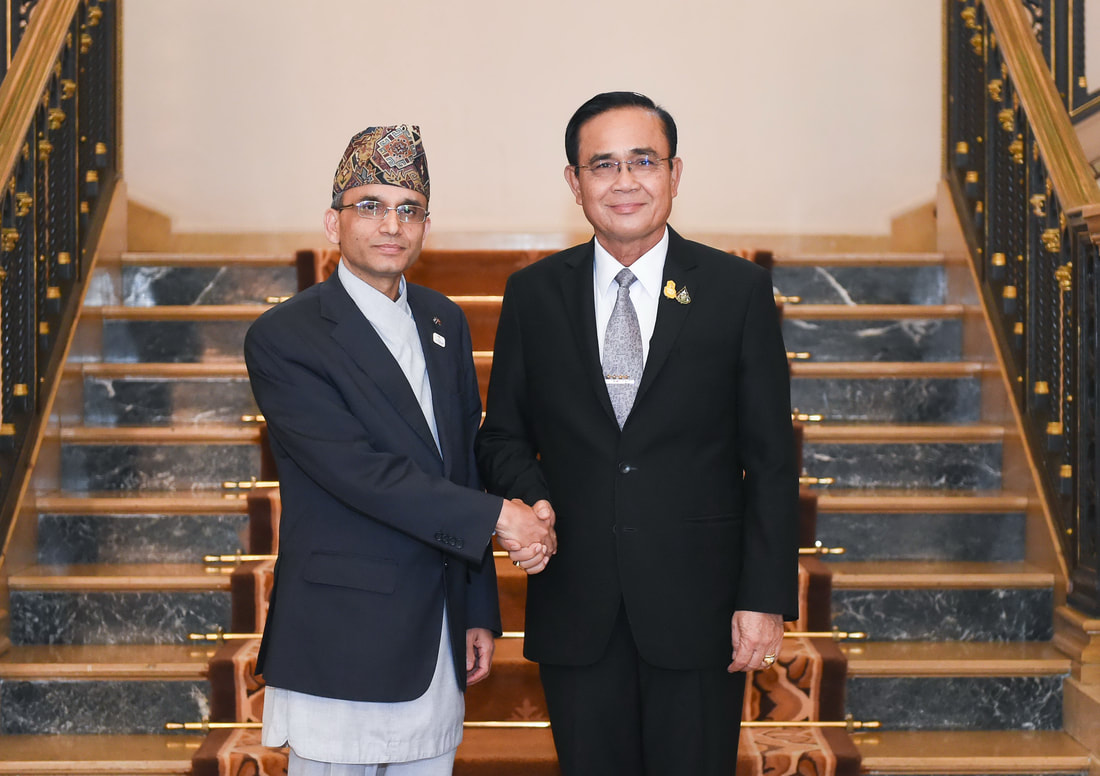
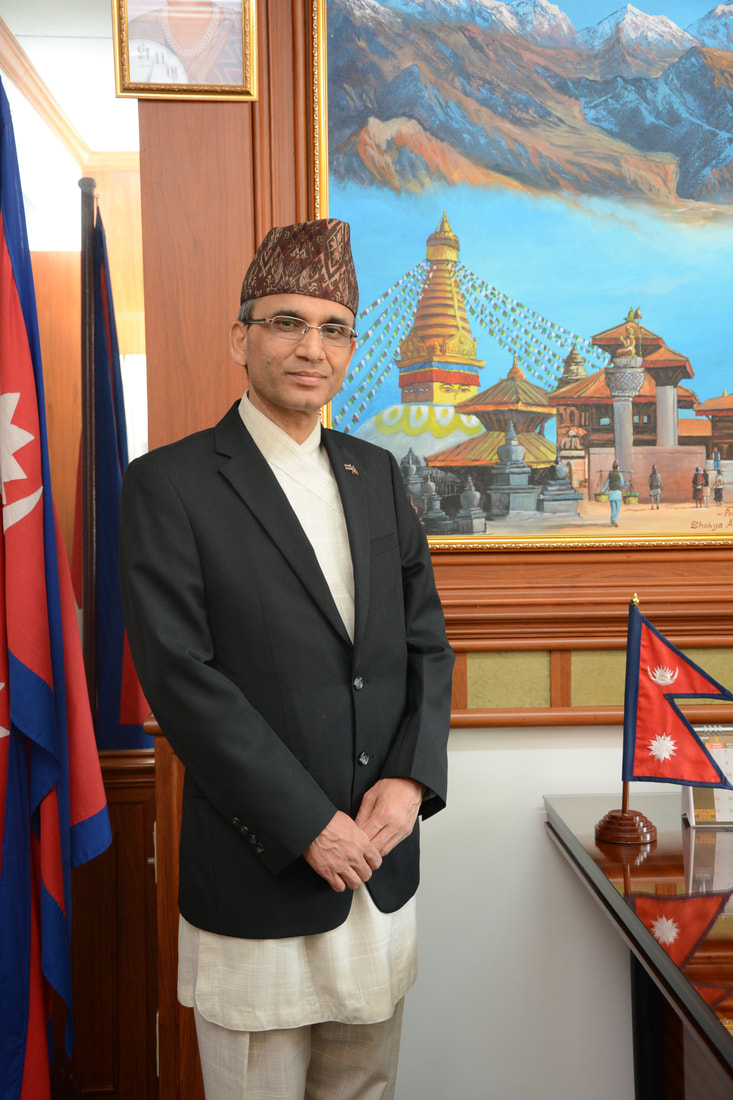
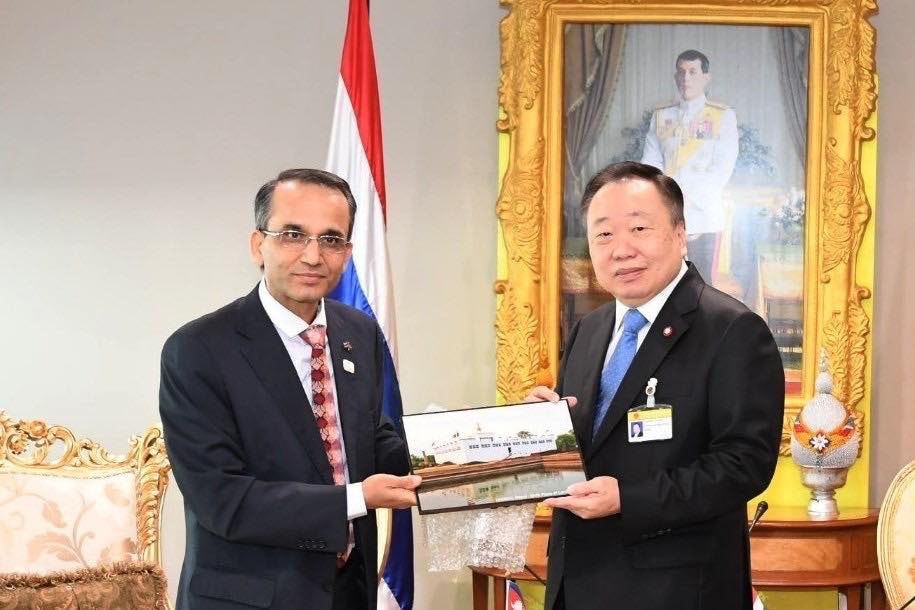
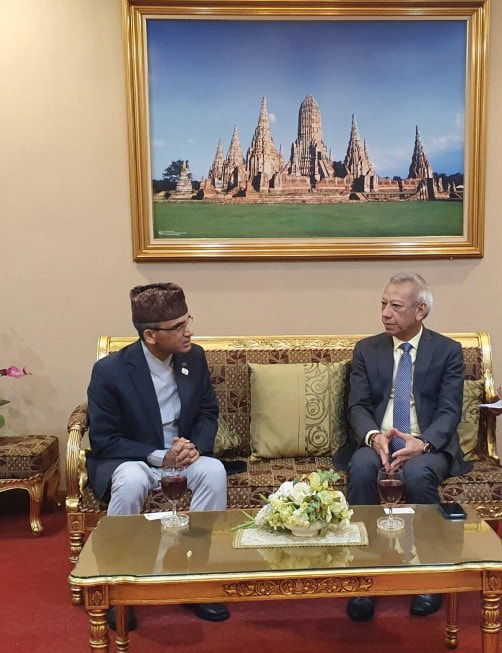
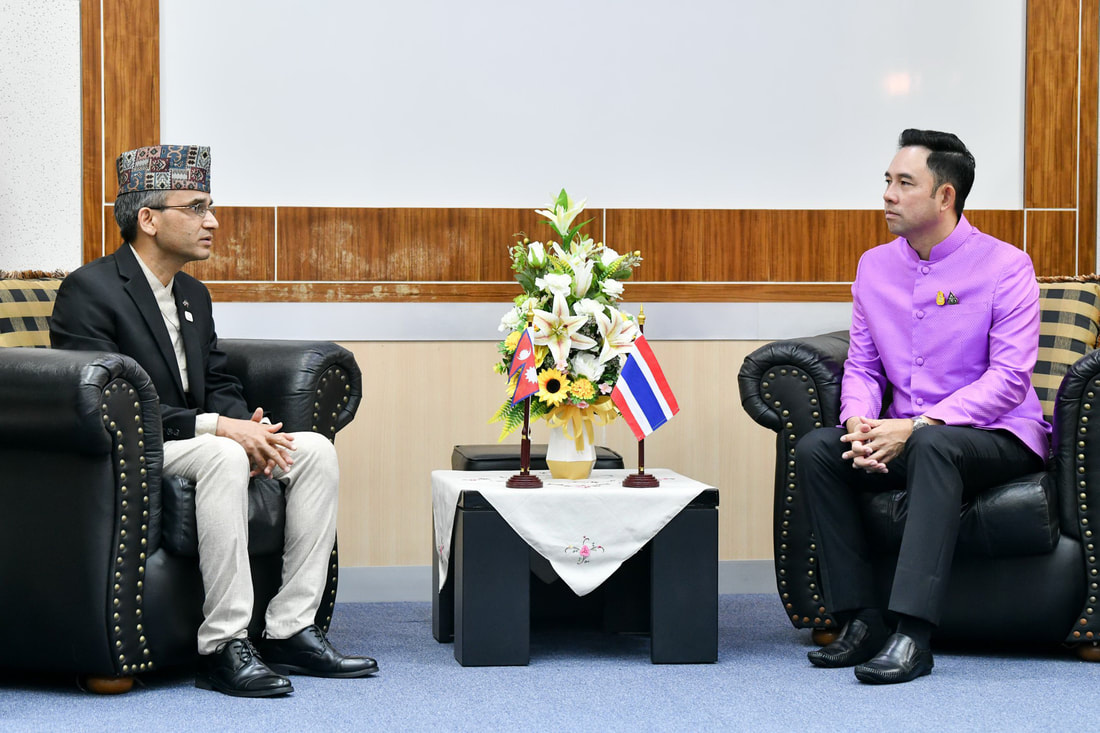
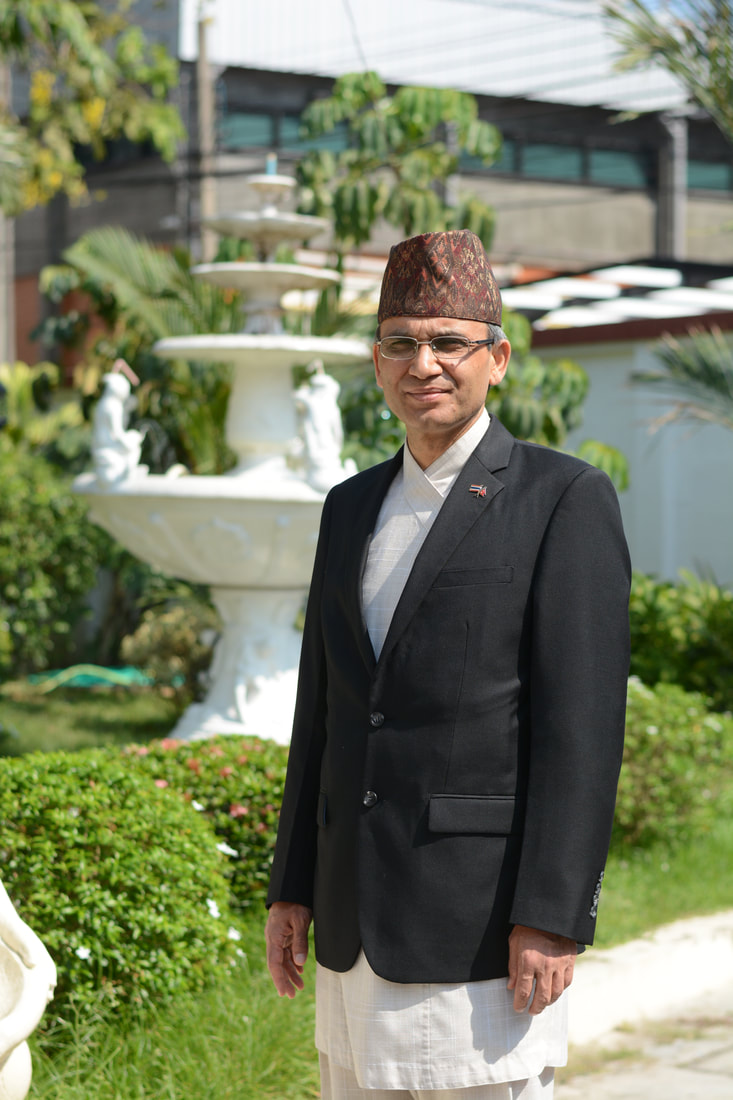
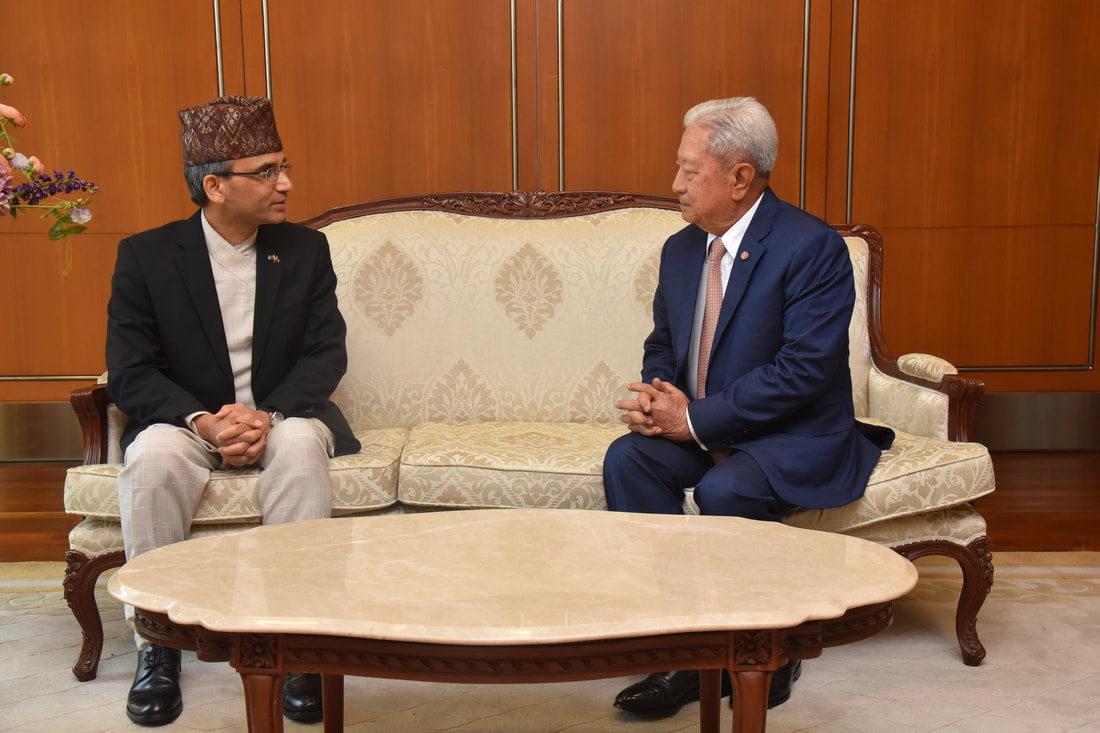
 RSS Feed
RSS Feed
















